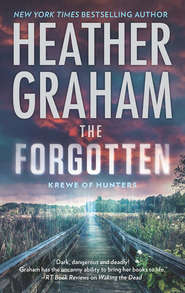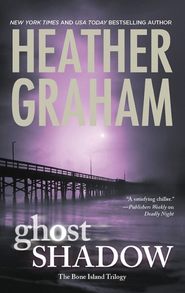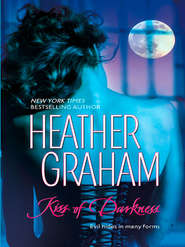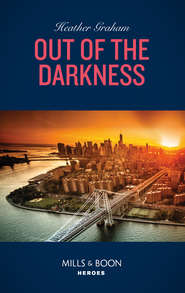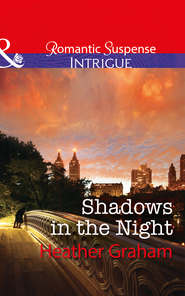По всем вопросам обращайтесь на: info@litportal.ru
(©) 2003-2024.
✖
The Uninvited
Настройки чтения
Размер шрифта
Высота строк
Поля
She stepped back to welcome her entire group of fifteen. “Good evening,” she said loudly, “and welcome to the Tarleton-Dandridge House, here in historic Philadelphia!”
Trees swayed gently in the breeze, and the air had taken on a sweet chill that might have been the promise of rain or merely the slow descent from summer into fall. Dusk was coming, and with it, a soft fog. They hadn’t shortened their hours at the mansion yet, but the last tour was usually out while there was still a glimmer of light in the sky.
Watching the sky and feeling the breeze, Allison Leigh thought she didn’t mind the long days at all, even if she was tired tonight. Of course, a lot of what she did was by rote and she could do it in her sleep, but she was fascinated by history, and adored the old historic house where she worked as a guide when her teaching schedule allowed. Summers generally meant full-time guiding. She liked people, too, especially children and young adults, and valued the opportunity to show them where the fate of a nation had been decided and to discuss both the Colonial era and the Revolution itself.
On most busy days the other three guides did their share of the tours. Annette Fanning, a good friend as well as coworker, had left early, scheduled for a root canal. Jason Lawrence was leading the tour group just ahead, dressed in the manner of the British dandy, Lord Bradley, who’d resided in the house when the patriots had fled. Julian Mitchell, the fourth guide employed by the private nonprofit corporation that owned the house, had disappeared around lunchtime. He was an effective guide, but he was also running around auditioning with his band, and had a tendency to show up late or disappear early. With the last of the school-age crowd going through at the tail end of summer, his lack of responsibility was irritating, but this tour was it for the night—and then she’d be ready to close up and go home. They all liked Julian; he was just driving them crazy.
“Watch out! A ghost’s going to follow you home,” a young man in the crowd whispered to the boys. He smiled, looking at the young woman with him, his wife or girlfriend, as if watching the boys because he might want a few of his own one day.
“I don’t think ghosts follow you home,” the younger of the two brothers said bravely. “I mean, they’re supposed to haunt a place, right?”
“Maybe they can follow you home!” his brother teased. “They can go through walls, can’t they?”
“Stop it!” the younger one said.
His brother made chicken sounds.
Allison clapped her hands to draw their attention back to the tour. “The Tarleton-Dandridge House is open to help you understand the Revolutionary War and the occupation of Philadelphia, not to send ghosts home with anyone,” she announced. “So, we’ll start with a brief history, although I’m sure you know most of this. Philadelphia was the first capital of the United States. And the Declaration of Independence was written and signed here. But by that time, shots had been fired in Boston—and the British navy was occupying Staten Island. What you may not realize is that the First Continental Congress worked here before they decided on independence. At first, they were seeking a means to achieve…can someone tell me?”
Oddly enough, it was her swaggering young beau, the older brother, who raised his hand. “No taxation without representation!” he said.
“Very good. So, since it looked like the royal foot was coming down to punish the colonies for their revolt against taxes—and they’d already risked being hanged for protesting lack of representation, the next step was to go all the way. Make the stakes worth the consequences, in other words. But it wasn’t the citizens of Philadelphia who were eager for war, or at least not all of them. Remember, this area was settled by the Quaker William Penn. He granted the city its charter. Those who believe in the Quaker creed are and have always been antiwar and antiviolence, but by the time of the American Revolution, this was a city of about thirty thousand, all mixed in their beliefs and backgrounds.”
“Yeah! They were ready to fight for freedom!” the older boy said.
She nodded. “By then the colonies had formed the Second Continental Congress, so a fight for independence it became. But Philadelphia would pay the price. The British wanted the capital. According to their logic, if you took the capital, the rest of the upstarts would fall apart and surrender. However, General George Washington had learned from his Indian wars, and he waged a different kind of warfare. Still, we lost many battles and, as I said, Philadelphia and her residents paid a heavy toll.”
She seemed to have won over the boys, which pleased her, and they were looking at her intently now rather than gawking.
“Gentlemen, if you will?” she asked the two brothers.
They actually seemed nervous as she walked back to the podium by the gate. She took out two mock Colonial muskets and gave them to the boys. The male guides carried exceptionally accurate reproduction muskets, but to entertain young adults before entering the house, the guides used mock-up plastic muskets.
“Now, how would you feel if I put you twenty feet apart and told you to shoot at each other? Do you think it would make a lot of sense?”
“You shoot enough and…I guess we could hit each other,” the taller boy said. “Eventually.”
“Maybe,” the younger brother added.
She nodded. “Muskets of the day weren’t great on aim. For every shot, a man had to load his powder, tamp it down and hope the enemy wasn’t upon him before he could fire again. What are your names?” she asked the boys.
The younger brother was Jimmy, she discovered, and the older one was Todd. She had them perform and they followed her instructions, demonstrating a manner of fighting in which they walked toward each other, and then another manner, in which one of them hid behind a tree.
“George Washington had learned well, don’t you think? He knew the British could outman, outpower and outdiscipline him. So if they wanted the city, he’d take to the countryside. Back in the 1770s, for about a hundred miles all around Philadelphia, there was nothing but wilderness. Washington could abandon the city, let the British move in for a while, and the Revolutionary government could keep trying to sway the French to join us, which happened in 1778. And the British knew they could become locked in, trapped. So they in turn had to abandon the city.”
Allison checked the little watch she wore on a chain around her neck, and saw that she’d given Jason plenty of time to take his group through.
“Shall we enter the house?” she said, opening the gate that led up to the handsome brick house.
“Let’s go!” Todd blurted out.
She arched a brow at him. He grinned, and she smiled back.
As she led her group into the small but beautifully manicured yard, Allison told them, “The house was built in 1752 of brick and stone, in what was known as the Flemish style, with alternating longer and shorter bricks. It was built for Lucy Tarleton’s father, an Irish immigrant who rose to success and attained great riches as a merchant—and had no love for the British King George.”
“Mad King George!” Jimmy said.
“Yes, so they called him.” Allison paused on the porch, waiting for the stragglers to catch up.
“King George never set foot here, of course,” she went on. “The days of kings leading their men into battle were long gone. But as for King George’s war,” Allison said, “there were two English brothers in control of the war effort here—Admiral Richard Howe on the water and General William Howe on land. One thing they hoped, of course, was that many citizens would be loyal to Britain and start coming out of the woodwork when they arrived.”
“And there were citizens loyal to Great Britain, right?” Jimmy asked.
“Yep. There were citizens loyal to Great Britain, although many moved to Canada—the United Empire Loyalists—when the war began. But this city was a prize to the British, harder to obtain than they’d expected.”
“The rivers weren’t deep enough for the Royal navy!” Todd said. “I know that because we’ve been on so many history tours already!”
“Exactly,” Allison agreed. “And there were numerous unseen obstacles under the water. It was difficult! But eventually they made their way here.” She continued the story she’d told so many times before. “Philadelphia fell to the British, and was held by them from September 26, 1777, through June 18, 1778. General Washington deprived them of greater victory by seeing that the city was abandoned and the Continental Congress moved to New York City. The British set up a puppet government in Philadelphia for that nine-month period. Meanwhile, the British soldiers enjoyed the warmth and comfort of some of these splendid homes, while Washington’s men froze at Valley Forge. And so here, at this beautiful mansion, Lucy Tarleton stayed behind, pretending to be loyal to the Crown, throwing parties, and even feigning a romance with Lord Brian Bradley—soon to be known as ‘Beast’ Bradley, and soon to execute—without trial or king’s command—the lovely patriot, Lucy Tarleton. Lucy was indeed passing British secrets to General Washington down in Valley Forge. She was passionate about her cause and she was to die for her efforts, in a rare but tragically vindictive incident. Follow me.”
The front door led through a tiny mudroom with cut-glass windows and then into a grand foyer. “In the city, you’ll find that many businesses were on the first floors of what are now historic buildings, while the living quarters were upstairs. But here, a servant would greet guests in the foyer, and determine where they’d go. Mr. Tarleton’s study was to your right, while the salon was the first room to your left,” she said, gesturing in those directions. “The kitchen is still a separate house out back, which prevented a cooking fire from reaching the main house. Beyond the salon is the dining room, and it gave the servants easy access to the kitchen. The left side of the house as you face me was the entertainment area, you might say, and to your right were the family rooms. In back of the study is the ladies’ parlor, and behind that, the music room. You’ll see an exquisite harpsichord there that actually belonged to the Tarleton family. Upstairs, there are five bedrooms and the attic, which contained storage space and rooms for the servants. The Tarletons had five household servants who lived in the main house and a number of gardeners and grooms who lived over the carriage house, which is also preserved.”
“Servants! I could use a few!” the boys’ mother said, ruffling her younger son’s hair.
Allison grinned and went on to describe various objects in the house. Then she explained that because of tight spaces and narrow hallways, they should go by themselves and look into the rooms on their own, respecting the velvet cord barriers. “So, please go ahead and walk through the first floor, and I’ll be here to answer any questions. Don’t forget to note the dumbwaiter at the rear of the dining room! It’s still in perfect working order.”
She stood in the foyer, in a central area so guests could question her. She was surprised when Todd came up to her. She suspected some kind of sexual innuendo, but he seemed oddly quiet and awed. “Miss, can you come here for a minute?”
“Sure, Todd.” She followed him to the doorway of Tarleton’s study. The room held his large carved maple desk, reproduction ledgers, quills, ink pots, study chairs and wooden shelves, some covered with glass doors. There were two paintings that dominated the walls in the room, one of Angus Tarleton himself, painted when he was a young man with shiny dark hair and bright blue eyes, traits he’d passed on to his daughter.
But Todd was staring at the other painting. He pointed at it.
“Who is that?” he asked in a whisper.
“Oh, that’s the man they called ‘Beast’ Bradley,” she told him. “Brian Bradley. Remember? We talked about him.” She stared at the painting, too. Bradley was a young man in the portrait, with a narrow face, high cheekbones, and dark, brooding eyes. Allison had always thought that although the portrait was certainly flattering, the artist hadn’t liked the man. The cruelty for which he would one day be known seemed painted into the sharpness of his features and the look in his eyes. He was elegantly dressed, in the fashion of his day. And while he was a general in the king’s army, she’d seldom seen him depicted in uniform. She assumed that wearing anything that might be rank and file—even with elevating insignias—would have been, in his eyes, beneath him.
Todd shivered, still pointing at the portrait.
“And a ghost will follow you home!” he said, and his words weren’t light. He was truly unnerved.
“He was a horrible man, but he’s long gone,” Allison said, surprised that the would-be “cool” preteen now seemed more like a scared schoolboy.
“He isn’t gone,” Todd said. “He…he looked at me.”
Despite herself, Allison felt a chill. She tried to tell herself the boy was trying to tease her, play off the situation and get her to slip an arm around him.
But he wasn’t playing any games. He appeared really frightened.
“It’s the way the portrait’s painted,” Allison assured him, but she found herself staring up at Bradley again. She never came into this room when she was alone, locking up and setting the alarms for the night. She always stood in the doorway, glanced in and moved on. While the house was equipped with a modern alarm system, they were supposed to make sure no visitors tried to stay on to defy the ghosts of the mansion.







